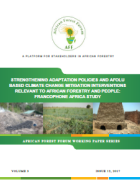This study presents the results of an investigation on the role that forests and trees can play in helping African societies adapt to climate change and mitigate greenhouse gases from the atmosphere. In this regard, it seeks to strengthen and further develop the forest – climate nexus, a key issue for Africa’s future development. The study was framed around eight sub-study areas and carried out through visits to five sampled Francophone African countries based on geographical location and forest type. They include: Burkina Faso, Côte d’Ivoire, the Democratic Republic of Congo, Madagascar and Cameroon. Respondents were drawn from six institutional groups, namely; government, intergovernmental organisations, international organisations, research organizations and agencies, civil society organisations, and the private forestry sector. The study revealed that there are three key determinants for the wider adoption of adaptation and mitigation interventions. They revolve around fiscal, technological and governance factors. Conditions for effective implementation of adaptation and mitigation interventions meanwhile were noted to revolve around organisation, legal and regulatory aspects, government coordination and a competent extension service. These elements surfaced in all the sub-studies of this investigation, prompting policy related proposals around fiscal, institutional and legal/regulatory benchmarks. Pertinent among others, of such open-ended benchmarks, are proposals for: promotion of multi-sectorial and multi-stakeholder platforms upstream, and forums downstream, as high impact governance pathways, facilitated by federating government bodies for transparent planning, sharing of experiences and harmonization of programs; creation and support of a carbon knowledgeable extension service to sensitize on carbon across the forestry, agriculture and energy divide, as well as; a national carbon agency to regulate and supervise schemes that engage carbon development, accounting and marketing.

